Report on BAB2025 by the Thessaloniki Organising Assembly and the Balkan Solidarity Network.
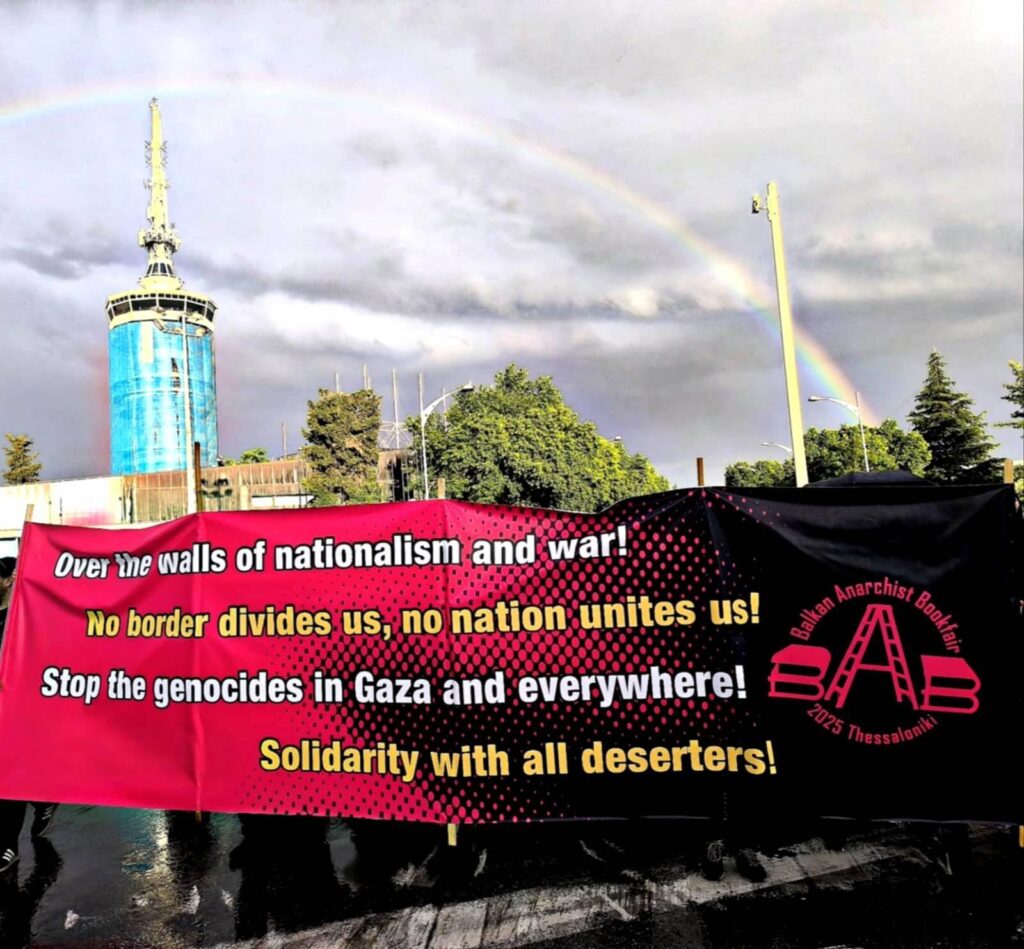
From 15th to 18th of May hundreds of comrades from all geographies of the Balkans and Europe gathered in Thessaloniki, Greece to participate at the Balkan Anarchist Bookfair (BAB) 2025. More than a hundred collectives and initiatives from the international anarchist and anti-authoritarian movement exhibited their books, zines, merch, and other materials, like products of the self-managed occupied VIOME factory. During the festival more than 30 discussions and workshops took place in two squats in the city, Yfanet and Scholeio, attended by hundreds of participants.
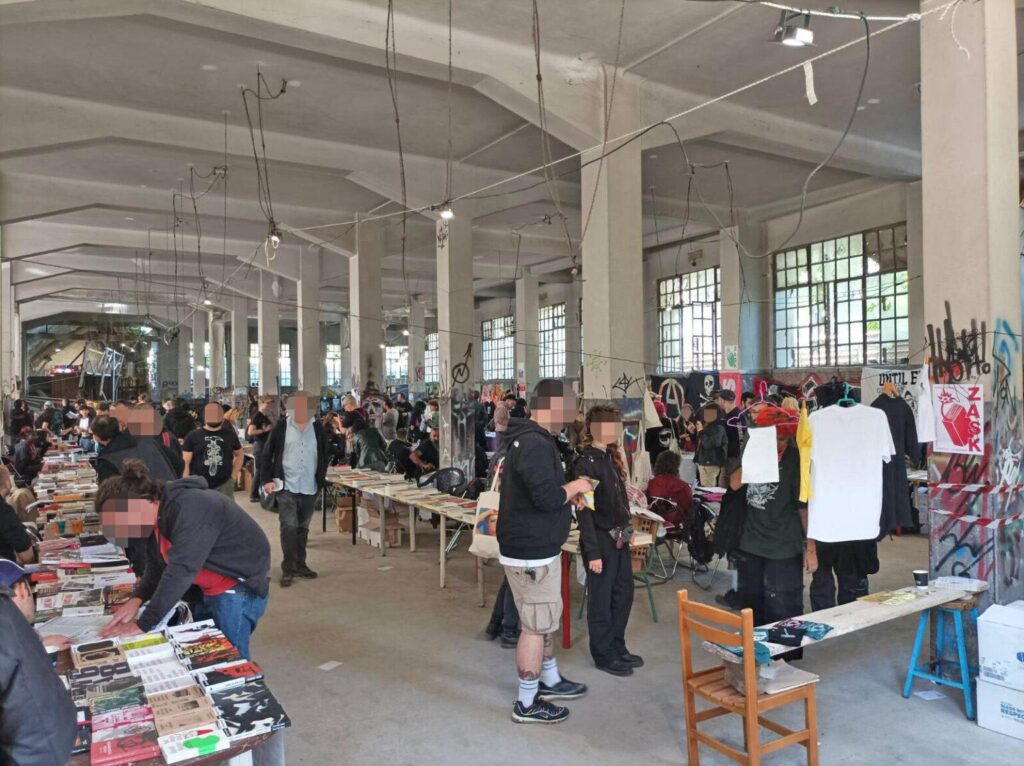
Besides the loaded program, many new contacts were made and networking was promoted by thematic meetings organized on the spot (on Palestine action, anarcha-queer and trans networking, migrants’ solidarity, student struggles, solidarity kitchens, etc.). On Saturday evening, a demonstration against war, nationalism, patriarchy, borders and capital gathered around 1000 people. The demo started from Scholeio under rain, passed through the city center as a rainbow was drawn in the sky above, slogans were heard in many languages and the demo ended up in Yfanet. It was followed by a concert with bands from Zrenjanin, Prishtina, and Sofia (musicians and artists from Thessaloniki, Bratislava, and Bucharest participated in performances and acts that took place in other days, while a photo and collage exhibition from New York on borders and migration was on display during the BAB).
★
“Balkan states are complicit. Stop genocide, colonialism and apartheid in Palestine”: this was written on the banner under which BAB participants joined the protest that was called by the Palestinian Community of Thessaloniki and took place on the afternoon of May 15, before BAB2025 “officially” started.
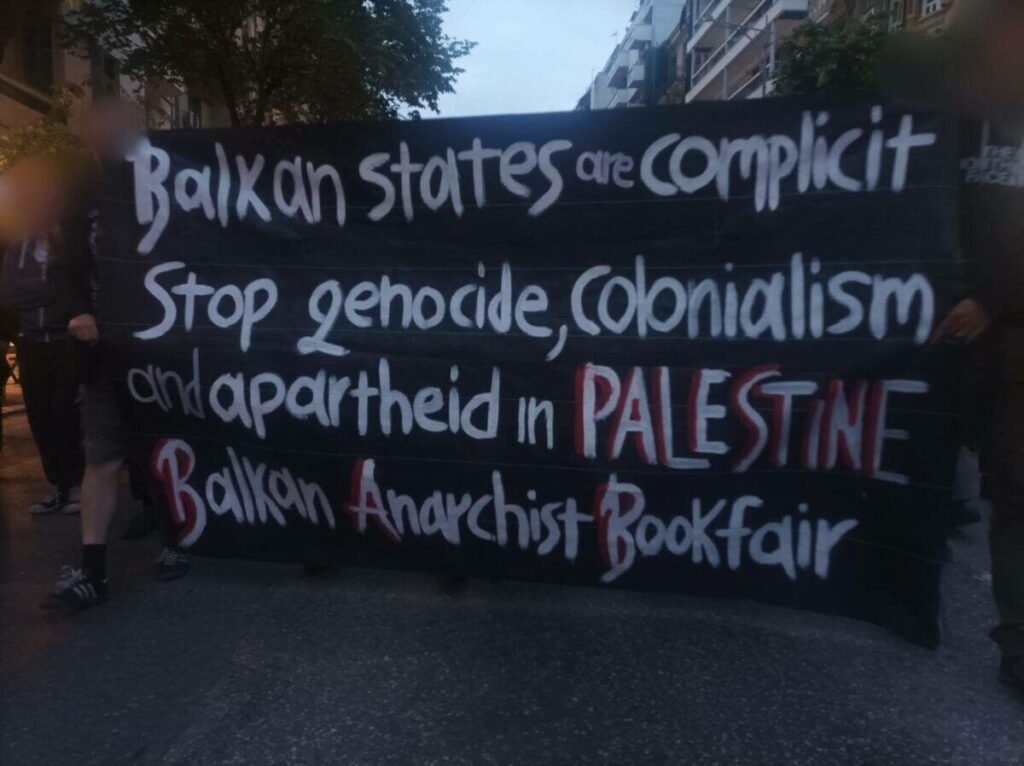
The bookfair began at the Free Social Space Sxoleio, after the end of the solidarity protest, with the first discussion focusing on the state crimes in Tempi, Novi Sad and Kochani and the mobilisations that followed, with speakers from Thessaloniki, Novi Sad and Skopje. The title of the event was complemented by the question “corruption or neoliberalism?”, a trigger for discussion, around how the indignation felt by larger and larger parts of society, for the specific crimes and the constant attack by the political-economic order that puts profits above human lives, could take on the characteristics of a broader rupture, questioning the state and capitalism. The next step, it was noted, will depend on whether participants in the protests against the state crimes are unleashed from the fiction that there can be a “better version of the state”. Important in this, is the practical questioning of authority through self-organized actions inspired by creation, inclusion, solidarity, direct democracy. An important parameter, highlighted in many interventions, is the racist and nationalist background of both the functioning of the state and the social perceptions prevailing in the geographies of the wider region. As it was pointed out, there was a much lower participation of society in the mobilizations against the crime of Pylos, where hundreds of migrants drowned under the responsibility of the Greek state, compared to the massive demonstrations for the crime of Tempi. Similar reports were also made about Novi Sad, where a short time before the crime at the railway station, a Roma family was burnt alive in a fire in their house, without any mobilisation by the local community or media reports about the living conditions and social exclusion of the Roma. Indeed, it was said that as part of the student movement’s activities in the area, an effort is being made to communicate with Roma communities.
“Our past words still stand” – this is the title of the screening that followed, a movie on the poet Markos Meskos (Vodena/Edessa 1935 – Thessaloniki 2019), who despite the fact that he grew up in the post-Civil war years and wasn’t allowed to speak a language that nobody dared called by its own name (Makedonski), became a recognised and honoured poet writing in another language: “Red black, red black, red black, fire! Historical dead-ends, muffled voices. The edge of the world, where can it be?”
During the following BAB2025 days, there were numerous workshops and presentations, elaborating positions and actions, but also focusing on practical aspects, like self-defence, first aid, dealing with gender violence in our spaces from a transformative justice perspective, and how to avoid leaving online traces, often used by the repression machine against activists and organizers.
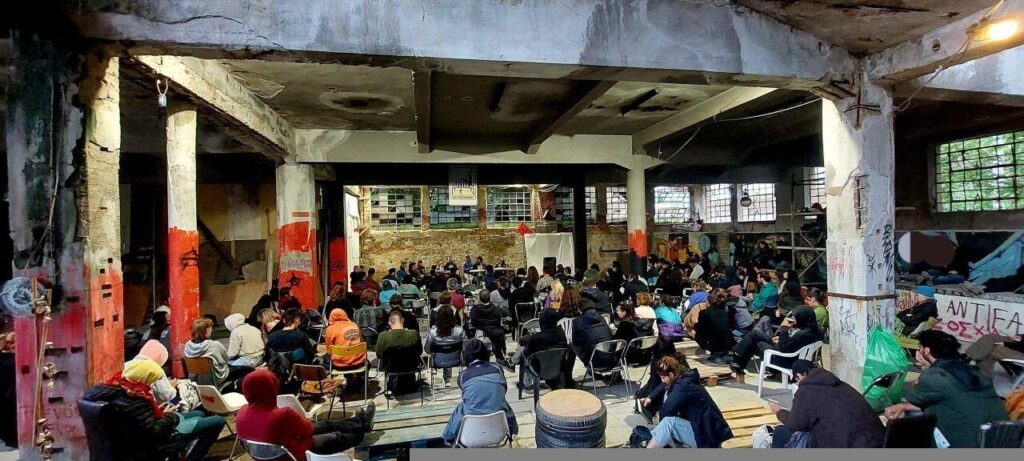
Many important issues were addressed in various discussions:
Militarization and refusals to military service. Starting from the key-role of militarism in the colonial state of Israel in order to rage its genocidal war against the Palestinian people,army refusal within anarchist thought and its significance as a direct and essential action against militarism and war violence, was presented, especially in the face of the resurgence of military conscription in European nations. The latter was connected to the broader war economy and the substantial allocation of national budgets to the arms industry, which perpetuates a global climate of fear and conflict. Anti-militarism and military service refusal has to extend beyond a purely individual stance towards becoming a form of collective resistance.
Decolonialism: How anarchism can evolve by engaging deeply with decolonial perspectives, fostering further connections with Indigenous, anti-colonial, and Global South struggles. The need to challenge and address Eurocentric assumptions within anarchist theory and practice.
Globalized capitalism, contemporary wars and the so-called opponents and supposed rivals. Having Iran as a key-study, the way that “antiimperialist countries” are integrated into globalized capitalism through changes in their infrastructures and “development” plans was presented. Alongside the plundering of natural resources and the control of strategic areas, the control of the workforce (making it cheaper, eliminating workers’ defensive power against repression, and reducing variable capital and production costs) is decisive. This “mega projects” process is advancing in Iran and the Middle East in the same way as it is unfolding in Mexico and South America. Corridors in various parts of the world play a crucial role to achieve this. The study of these commercial corridors and their role shows us that “antiimperialist countries”, and Iran in particular, regardless of its statal ideology, is not very different from many other countries in the world, especially in Latin America.
State repression, political prisoners and solidarity. The modernised repressive policies in Belarus, the banning of pride and the patriarchal oppression in Hungary, the repression against international antifascists after the 2023 counter protests against the extreme right-wing Day of Honour in Budapest (warrants against 18 comrades, arrests in many European states, eleven comrades in prison, some still underground), the possibility of imprisoning squatters in the coming courts, where comrades who combatively resisted the eviction of the Koukaki Squats Community (Athens) are in danger of going to jail. These are some of the cases that were presented in various discussions during the BAB2025. The specific event on the key-topic of anarchist/political prisoners and solidarity with them presented also updates on current cases in Europe and in Greece, specifically on the case of the imprisoned antifascists prosecuted for attacks on fascists in Hungary, on the case of Daniella Klette who has been imprisoned in German prisons since February 2024, and on the wanted members of KOMITEE who are returning to Germany after 30 years on the run. Furthermore, the texts of the two anarchist comrades Marianna M. and Dimitra, who are being prosecuted for the case of Ampelokipi, were read, giving an update on their case and honouring the memory of comrade Kyriakos Xymitis. The briefings were followed by an input by the collectives that organised the event. This focused on the importance of solidarity and support to the imprisoned strugglers. They also mentioned deficiencies in the field of support, as well as practices used mainly in Greece. Inputs by two former prisoners, Yannis Michaelides and Dimitris Bourzoukos, followed. Finally, a short discussion followed, as there were not many questions from the participants and there was not enough time, which could be considered as a drawback in a generally successful event, that was well received and with a large turnout.
Libertarian education and self-education: Libertarian education was included as a BAB key topic for the first time. There was an effort to present a broad overview of what this movement includes in different contexts, particularly in the geographies of Greece, Italy, and Serbia. The interest in the subject is evident by the number or collectives that participated in the panel discussion: The “Children’s house and self-education structure of the Community of Squatted Prosfygika”, the “Children’s structure of the housing squat for refugees/migrants on Notara 26”, the “Self-organized pedagogical endeavour for preschool ages ‘Mikro Dentro’”, the “edu project with Roma kids and teens”. the “Koko Lepo collective” (Belgrade), and REL (Rete per l’Educazione Libertaria / Libertarian Education Network). Besides the key-topic discussion, Fuego Negro Editorial from the geography of Colombia held a workshop on “Anarchist Itinerant Practices (AIP) – libertarian education and self-education”.
Climate Crisis, Capitalism and Struggles for Land and Freedom: “Recent years have been characterized by an unprecedented plundering of natural resources by capitalist mechanisms, with huge imbalances in their distribution and even greater consequences for underprivileged subjects. Against a model of continuous growth and profitability that does not respect ecosystems and life as a whole, it is more than necessary to set our own terms and our own proposals for a life worth living by all, in equitable and truly ecological terms.” Representatives of the Struggle Committee of Megali Panagia (part of the emblematic Halkidiki struggle against goldmining), the “Assembly for the defense of the mountains” from Athens, and the “Zadruga Urbana” collective from Ljubljana presented struggles for land and freedom in different geographies of the Balkans through anti-authoritarian approaches. A key-point of the discussion was the rejection of ‘green growth’, the green development that is spreading in the Balkans and the exchange of experiences and struggles against it. The speakers also stressed the need to link ecological struggles with self-organised food production. We agreed that ecological struggles and food production are closely connected. Both fight against the exploitation of land whether it is for large energy projects, tourism and gentrification, or massive single-crop farms. Big energy plans and industrial farming are intertwined with capitalist mechanism, so ecological struggles are directly linked to struggles against capitalism. We concluded that there is a need to strengthen the existing networks across the Balkans, connecting groups and initiatives from both urban and rural areas to support each other, learn from each other, and create a common ground of struggle.
Anarchist squats and autonomous social centres: this key-topic discussion took place at the Yfanet squat on Sunday 18 May. At the beginning there was a presentation by the working group about squats and social spaces in Greece. More specifically, the presenters referred to the way in which we perceive squats and movement structures as a means of struggle, mentioned some historical facts about the defense of squats at key moments for squats in Greece and came to the present day, analyzing the context and emphasizing the importance of networking and mutual support of squats and wider structures of struggle. Libertatia squat talked about the struggle on the defense of the squat starting from the arson that occurred in 2018, the decision to rebuild it, the campaign “Rebuilt Libertatia”, the incursions of the cops who sought to stop the works and the repression of the people where they were performing them, ending in today in the ongoing struggle that aims to reclaim the squat, “Reclaim Libertatia“. The next input was by Komuna Qendra Sociale, Pristina, which explained the difficult conditions of squatting in Kosovo, which in addition to the repression of the state have to deal with a very blurred political context around squatting, which is created as sometimes squatting is carried out for individualist purposes. The Self-managed Shelter of Karditsa was also there, and spoke about its evacuation and its role in the local community. Finally, a rich discussion followed in which people from different countries participated who communicated the situation around squatting in their own geographies. Various questions were raised, mainly about how to achieve a squat.
Movements’ structures. The need to create, connect and multiply the movements’ structures was stressed in the parallel discussions on anarchist/anti-authoritarian media, publishing infrastructures, movement archives, and libraries. Printing and publishing infrastructures (Druck Press Collective, Thessaloniki – Rotta Press Collective, Athens – Titivillus Press Collective, Ioannina and “Pyco Nero” self-organized printing structure, Athens) had their separate meeting highlighting the struggles in maintening the print collectives and portaying the opportunities for the continuation of them, as well as proposing the creation of a network of self-organised radical print collectives. Anarchist/anti-authoritarian libraries from various geographies (Archivo digital de las amigas de Sophia Perovskaya und Dmitry karaksazov, Self-organized library of Southern Evvoia, Μalobeo, an anarchist library and info-shop, Salibabios, library of Ano Kato Patisia squat, Self-organised library group of Prapopoulos squat among others who also joined on the spot) did the same: “The library gains significance simply through the presence of an organized collection of printed publications within a space. Its unique composition and curation characterises our collective coexistence and vice versa. People wander through the library and discovering it as if it were a game. They can visit various eras and places, breaking free from the daily time patterns of work hours and productivity. In this way, people can meet again with themselves and connect with each other” (self-presentation of the library group of Prapopoulos squat). The libraries shared experiences and concerns on both the physical and digital aspect of their struggle and agreed that there is a need to find a common place to connect with the archives. Social movement archives from the Balkans and beyond also met and exchanged ideas:“Collective memory is neither nostalgia nor sectarian or a party’s memory. It is the living thread that connects the struggles of the past with those of the present and the future. It is the subversion of the linearity of capitalist time, through the reconstruction of the ruptures that illuminated, if only for a moment, a world beyond capital” (Call for the meeting by the movement archive of Fabrika Yfanet squat). Self–organised digital and media platforms for information and culture from various Balkan countries and Greece such as 1431 AM, Athens Indymedia, Cybrigade, Crna Luknja, Electric Requiem, Info Libre, KPaX Radio, and Kinimatorama had their own meeting, where alternative networking projects outside digital capitalism and its speculative policies against users were discussed: digital forums characterised by horizontality among users, self-organised radio stations, music and art free-sharing platforms and many more…
Borders, migration, resistance to Fortress Europe. “War on migration is war on society”. This is the title of a 40 pages brochure prepared for BAB2025 by the assemblies “Stop War On Migrants” (Thessaloniki), “Open Assembly Against Pushbacks and Border Violence” and “Borderless” (Athens), and “Open Assembly Against Border Violence” (Lesvos). The text focuses on “militarisation, criminalisation and the need of organization and upgrade of struggle”. Nevertheless, participation in this key-topic discussion was relatively low, particularly among people from Greece, which is troubling given the seriousness of the situation. There is a need for a better network among the collectives, initiatives and also the people that are influenced more. In the panel there was also an input by the Rosa Nera squat (Chania, Creta) and participants included comrades active in different Balkan areas (mainly in Bulgaria) and other European geographies. “Stop War on Migrants” focused on a genealogy of the migration phenomenon in Greece, attempting to map the different techniques that the Greek state provisioned and used against migrants. The comrades of “Open Assembly Against Border Violence” described how the techniques of pushbacks which were normalised since 2020 continue to take place in the island of Lesvos. The two collectives from Athens (“Open Assembly Against Pushbacks and Border Violence” and “Borderless”) focused on the issue of grassroots organising and attempted to formulate questions and respective answers concerning the creation of a common ground for different struggles of locals and migrants. The comrades from Rosa Nera squat described how the abandoning of the “Balkan route” because of the pushbacks in Northern Aegean and Evros region, forced migrants to try to cross to Europe by traversing the waters near Crete island.
Struggles against femicides, patriarchy, and gender oppression. This discussion gathered a lot of participants. The global situation and the numerous recent attacks on gender, sexuality and reproductive rights were presented by the queer-feminist group Calvaluna from Thessaloniki. The group Tsoupres from Ioannina shared their conclusions based on the recent pamphlet they published on femicide, the attitude of the feminist and non-feminist movement over the years around it and the mediation by the media. The vrannne collective from Zagreb spoke about the rise of Christianofascism in Croatia and the need for immediate responses on the street and the need to create communities and networks of care and solidarity here and now. The WISH* group from Lesvos shared their experience of the conditions in the camps on the island, the effort to create stable communities of local-migrant solidarity and the breaking of the invisibility of migrant women from public discourse and space. Finally, the Feminista Akciό group from Budapest spoke about the situation in Hungary, the political climate and the new legislative changes, and pointed out the need to support the June 2025 pride protest in Budapest, that was banned by the government.
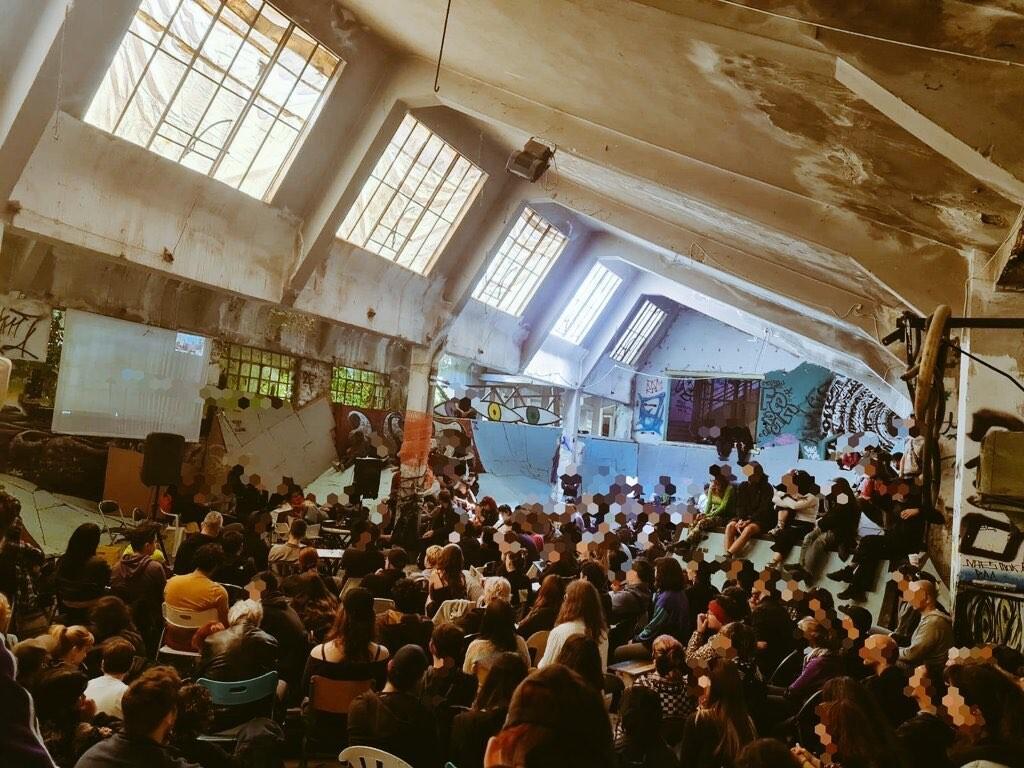
Capital, State, war and anarchist responses. “In addition to the war in Ukraine and the genocidal ethnic cleansing in Gaza (and its chain of consequences in the Middle East), wars are going on in Myanmar, in the Sahel countries, in West-Central Africa (a region named the coup belt in geopolitical analyses), in Sudan, Ethiopia, Somalia, Nigeria, DRC Congo, in the mountains of Kurdistan, but also in a number of Latin American countries, starting with Mexico, where the war of Capital against societies takes the form of a war of drug mafias. Furthermore, there is also a large number of ‘low-intensity’ wars, and wars against the poor, where globalised economy is used for the violent conquest of societies. Against this bleak backdrop, unfortunately, we do not see an international, anti-war, anti-capitalist movement rising.”
This discussion gathered the largest number of participants. Hundreds of people followed the presentation by a Palestinian speaking from the West Bank, who described the acceleration of violent land grabbing by settlers under the cover of the Israeli army and the deterioration of the apartheid regime after October 2023. “The digits broadcasted at the daily reports of death are not some numbers, these are actual human beings. Human beings, who are not ruled by some death drive, but people of flesh and blood, dreaming of life. At this point, and under these circumstances, resistance is simply to survive.” This was stressed by a Palestinian from Gaza living in Thessaloniki who described the dehumanization and extermination of the population of the strip in the context of the genocidal ethnic cleansing underway, calling for mobilization in our lands against the Israeli extermination machine and all the states who are complicit in the massacre. On the part of Israeli conscientious objectors, it was stressed that the vast majority of those demonstrating in Israel to end the war are not demonstrating against occupation and genocide, and they emphasized the need to broaden international mobilizations.
Moving to the Balkans, a comrade from the geography of Kosovo described the treatment of the Albanian population as second-class citizens within the various versions of Yugoslavia, the current rule of neo-colonialism of international capital in the region and how both the governments of Serbia and Kosovo are using nationalism to exploit “their” populations. “Regardless of the pretext of each nationalism, all of them are ultimately a war of capital against society.” Moving to the war in Ukraine, the “Assembly” collective from Kharkov participated with a text (“Fenced island of pain”) describing the general feeling of despair, the desertions to both the Russian and Ukrainian armies, the refusal of people to become cannon fodder for the profits of the bosses: “it is better to be a termite, little by little weakening the edifice of militarism, than a flea on the tail of one of the squabbling dogs”. The discussion showed the need for transnational communication and coordination of actions against the new global era of war and the genocides taking place in Gaza and elsewhere, but the only proposal that has been submitted is that of the IAF, for mobilizations against the NATO summit (The Hague, June 24-26).
Feedback on the Festival’s organization and events
In general, during the assembly of the Balkan Solidarity Network that took place on Sunday, May 18, there was positive feedback on the organization of the festival, hosting, etc. Regarding the organization of the discussions, participants suggested avoiding having many parallel discussions. One important feedback on format was that we should make better use of our limited time for direct exchanges between us, that is, to avoid reading long statements or manifestos in the sessions, to instead leave more space for constructive discussions and specifically to plan future activities to build the movement together. It was also suggested to have breaks between sessions to allow time for networking (in order to avoid burnout), and also to create a designated space after presentations for that purpose.
The issue of language also was mentioned: we are not speaking our native languages but the language of the dominant powers (English). This is a deeper issue that cannot be solved immediately, but perhaps educational collectives could help us find ways to approach it. The Zapatista example could be a useful reference. We should also consider translation into sign language, and make sure to ask in advance if people need translation support. A small translation team could be formed for this purpose. The concern about language is valid, it’s important to avoid eurocentrism and cultural colonization.
Overall, it seemed that Greek participants and groups took up more space in the discussions. It was suggested that the Balkan character of the gathering should be better preserved. Another proposal was to hold a preparatory conversation for people coming from other places, to share how we organize and mobilize in the streets.
For those coming from smaller towns and villages, large gatherings like BAB are found to be very important for networking and supporting local initiatives.
Although we might be different, we come from different places, we organize in different ways or even might have some disagreements, we prove that we can make it together, exchange ideas, practices and perspectives. In addition, the focus should be more on building common coordination for future actions.
Coming events
Besides the call to participate in the actions against the genocidal ethnic cleansing and the apartheid regime in Palestine, concrete future actions were announced/discussed during BAB2025:
- June 14, 2025: Protests for the two years of the Pylos mass state crime.
- June 24-26, 2025: Call by the International of Anarchist Federations for protests against the NATO summit.
- June 28, 2025: Banned pride march in Budapest.
- August 5-10 (ZAD-Nantes): Transborder Summer Camp (transnational gathering for Solidarity on the Routes, for interconnecting migrants’ struggles and more).
- September 5-7: Zagreb Anarchist Bookfair.
source: A Rainbow of Struggles – Balkan Anarchist Bookfair 2025